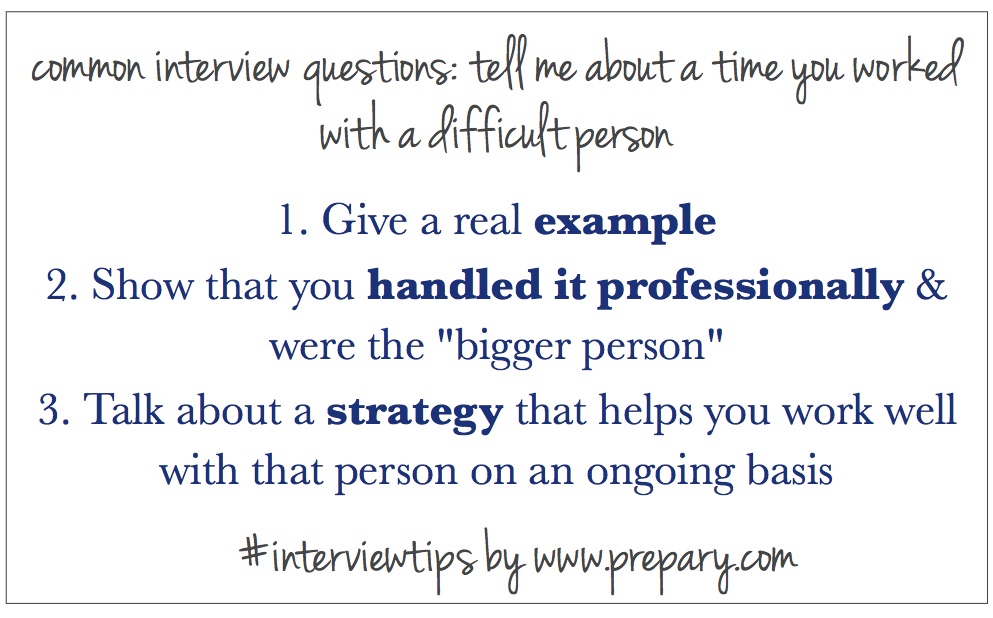Common interview question: “Tell me about a time when you worked with a difficult person.” or “Tell me about a time you worked with someone challenging”
Why they’re asking: You’re going to come across people who are difficult in every office (ever). That’s obvious. They want to know if you will handle those people in a way that is appropriate and professional or if it will send you into a tailspin and affect the quality of your work.
How to answer: 1. Give a real example, 2. Show that you handled it professionally & were the “bigger person”, 3. Talk about a strategy that helps you work well with that person

Now to elaborate:
1. Give a real example – As with all “tell me about a time” questions, your interviewer does want to hear about an actual instance when this happened to you so remember to speak in specifics. Lay out the situation without getting into too many nuances or describing any office politics or “drama”.
Example: “When I was working on an important initiative with a large team, one team member refused to see anyone else’s point of view.”
2. Show that you handled it professionally & were the “bigger person” – This is the type of person every company is looking for. I don’t think any interviewer wants to hire someone who reacted poorly to a difficult person and made the situation worse. Describe how you took steps to resolve the situation without losing your cool.
Example: “I knew that we weren’t going to be productive if we couldn’t get this team member to collaborate. I pulled them aside after our first meeting and told them how much I valued their opinions. I also emphasized that since we were a large group we had to pick our battles and be somewhat flexible. I think once I pointed that out, they understood the negative impact they were having on the team.”
3. Talk about a strategy that helps you work well with that person on an ongoing basis – This is really just explaining to your interviewer that not only did you solve the issue at hand, but you used what you learned to work with the difficult person in general (since they’re not going anywhere!) This part really just wraps up your story and shows that you’ve been able to learn from the situation.
Example: “When I saw how well they responded to our conversation, I realized that instead of arguing with this person in the moment, it was more productive to pull them aside one-on-one. It’s still not really easy to work with this person, but I’ve found a way to make it manageable.”
Bringing the 3 sections together, our example looks like this.
When I was working on an important initiative with a large team, one team member refused to see anyone else’s point of view. I knew that we weren’t going to be productive if we couldn’t get this team member to collaborate. I pulled them aside after our first meeting and told them how much I valued their opinions. I also emphasized that since we were a large group we had to pick our battles and be somewhat flexible. I think once I pointed that out, they understood the negative impact that their behavior was having on the team. When I saw how well they responded to our conversation, I realized that instead of arguing with this person in the moment, it was more productive to pull them aside one-on-one. It’s still not really easy to work with this person, but I’ve found a way to make it manageable.
So remember, show you are professional, don’t get too worked up in the details of the situation, and show an effective solution. This will help you come across in the best light as your answer this very common interview question.






